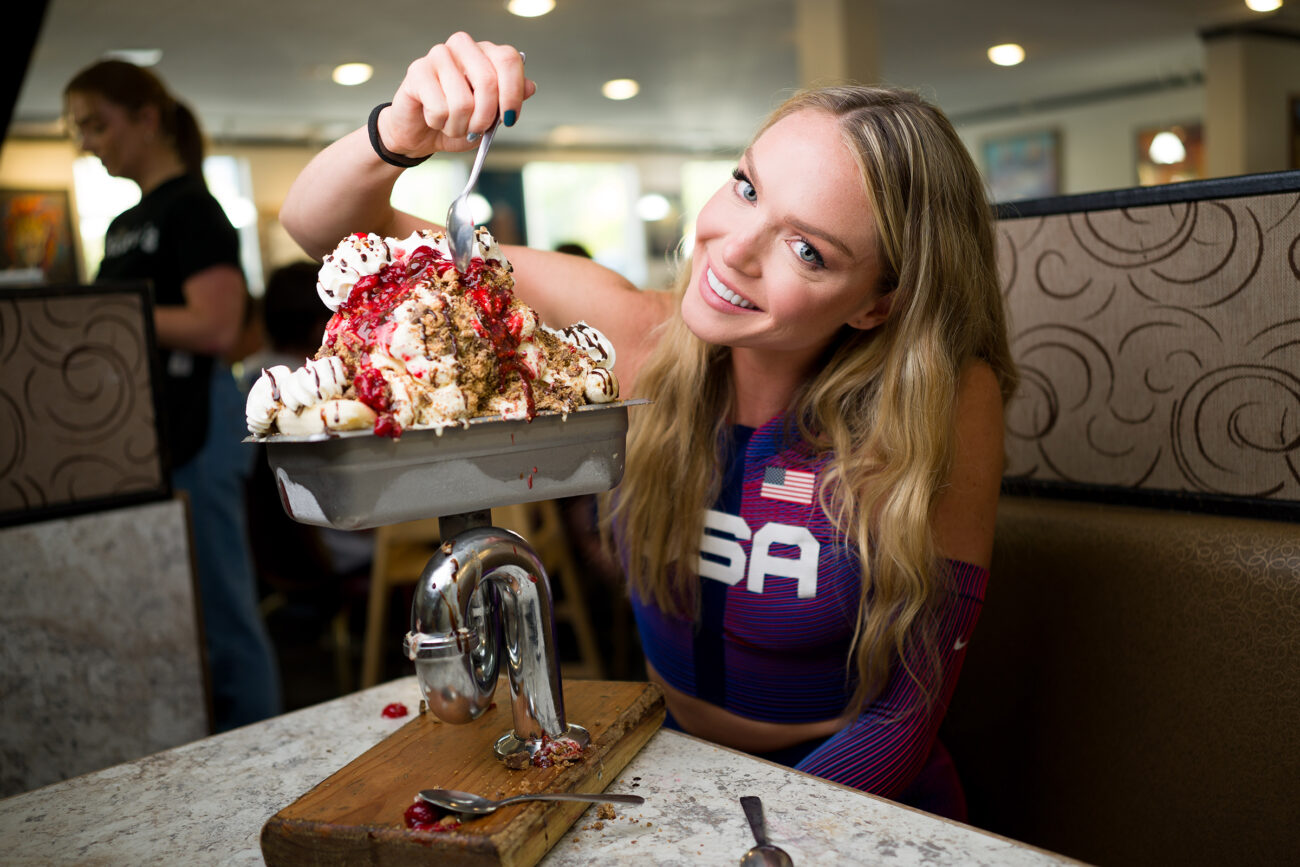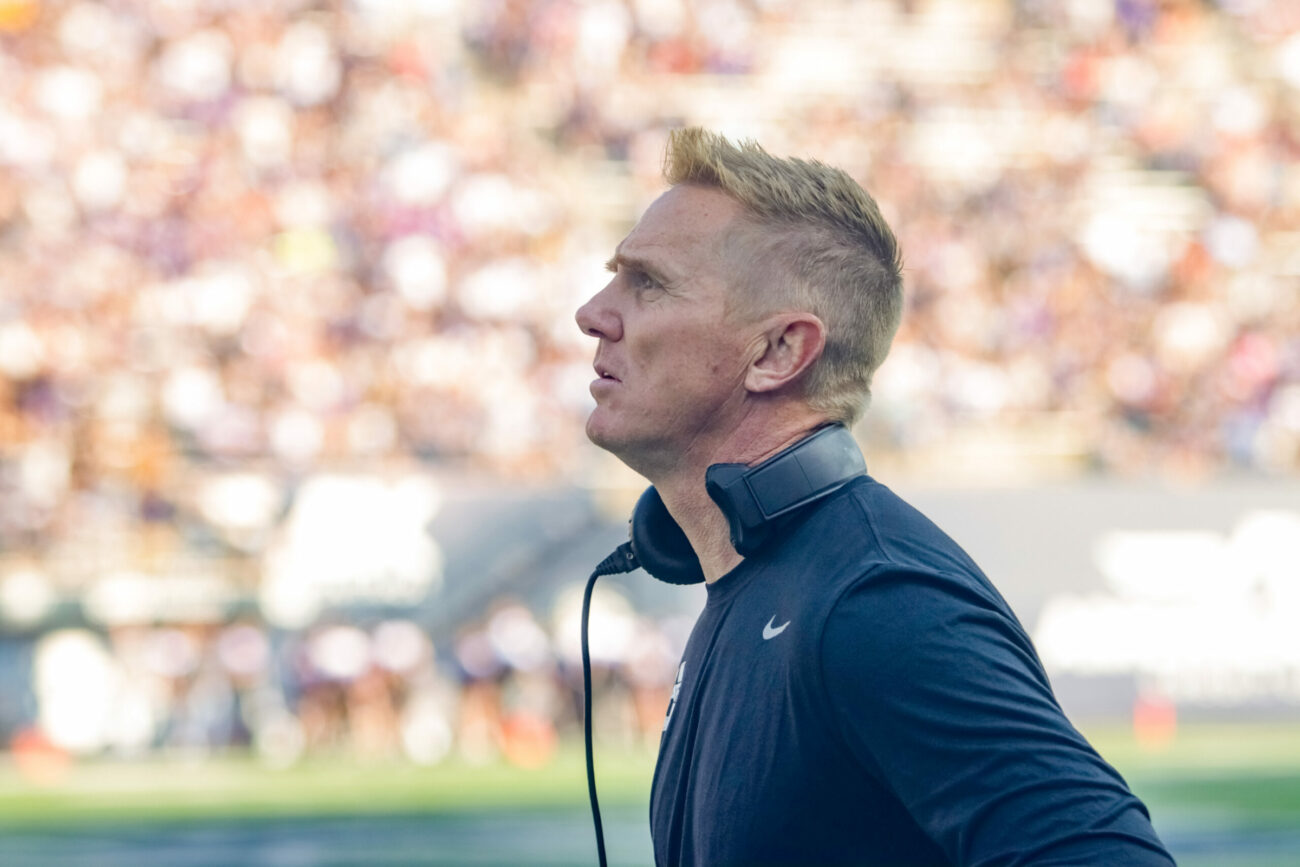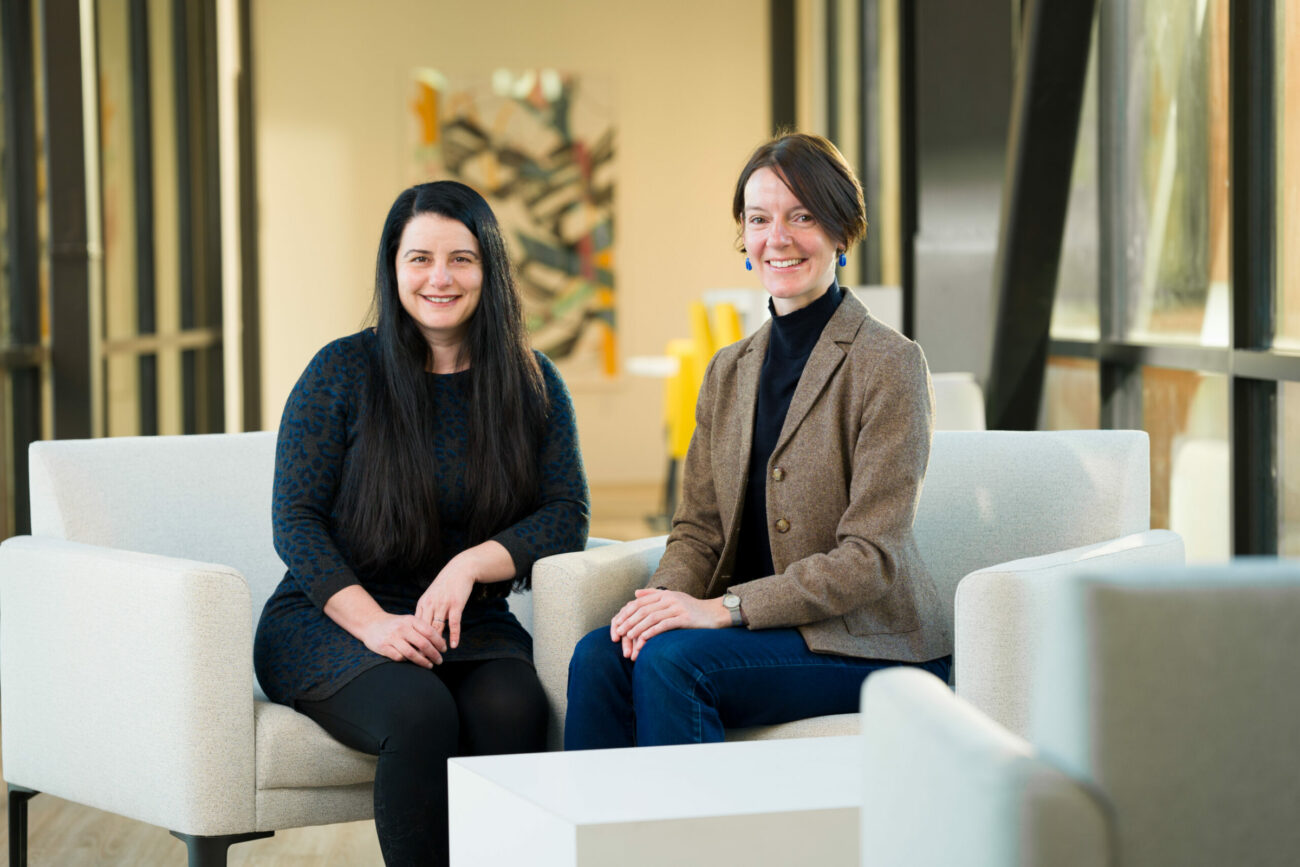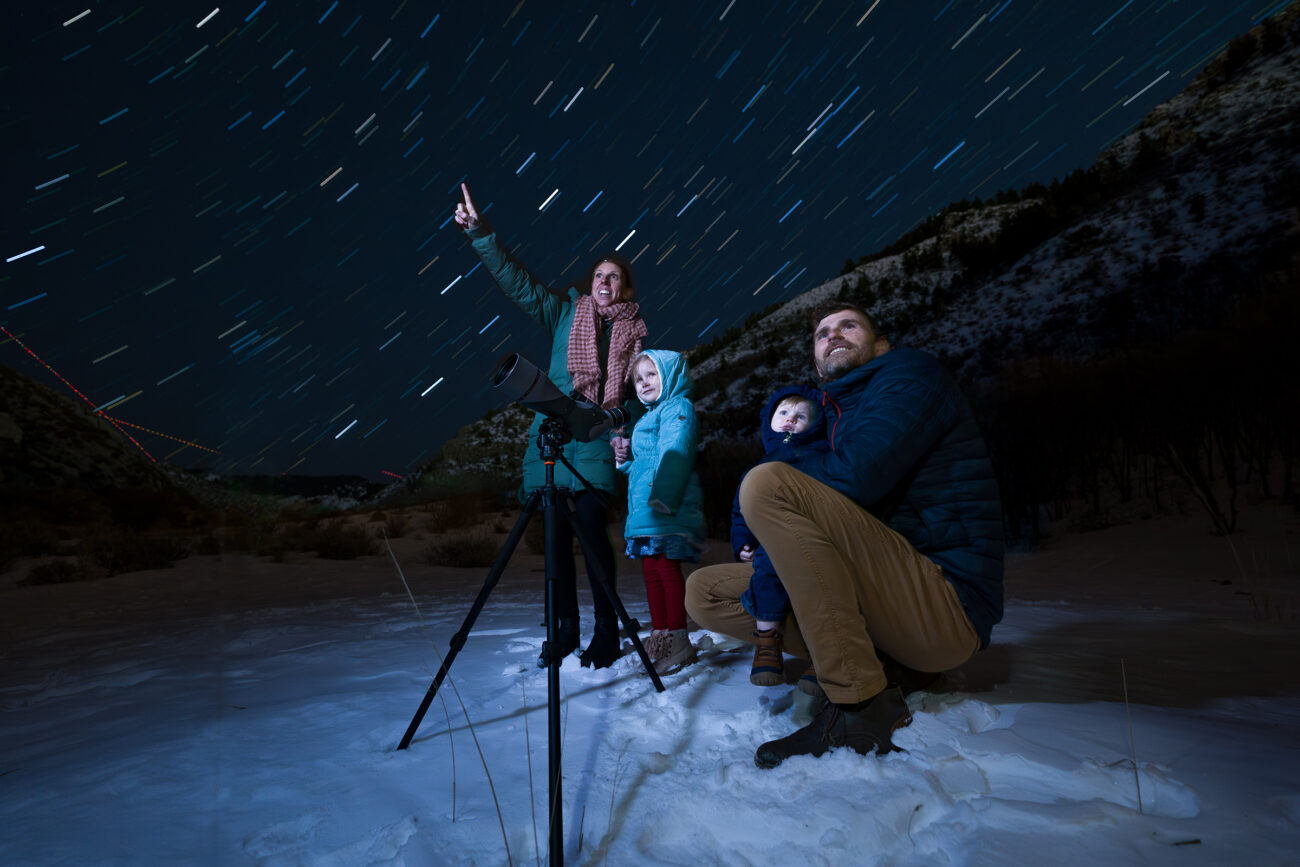Raised to do Hard Things
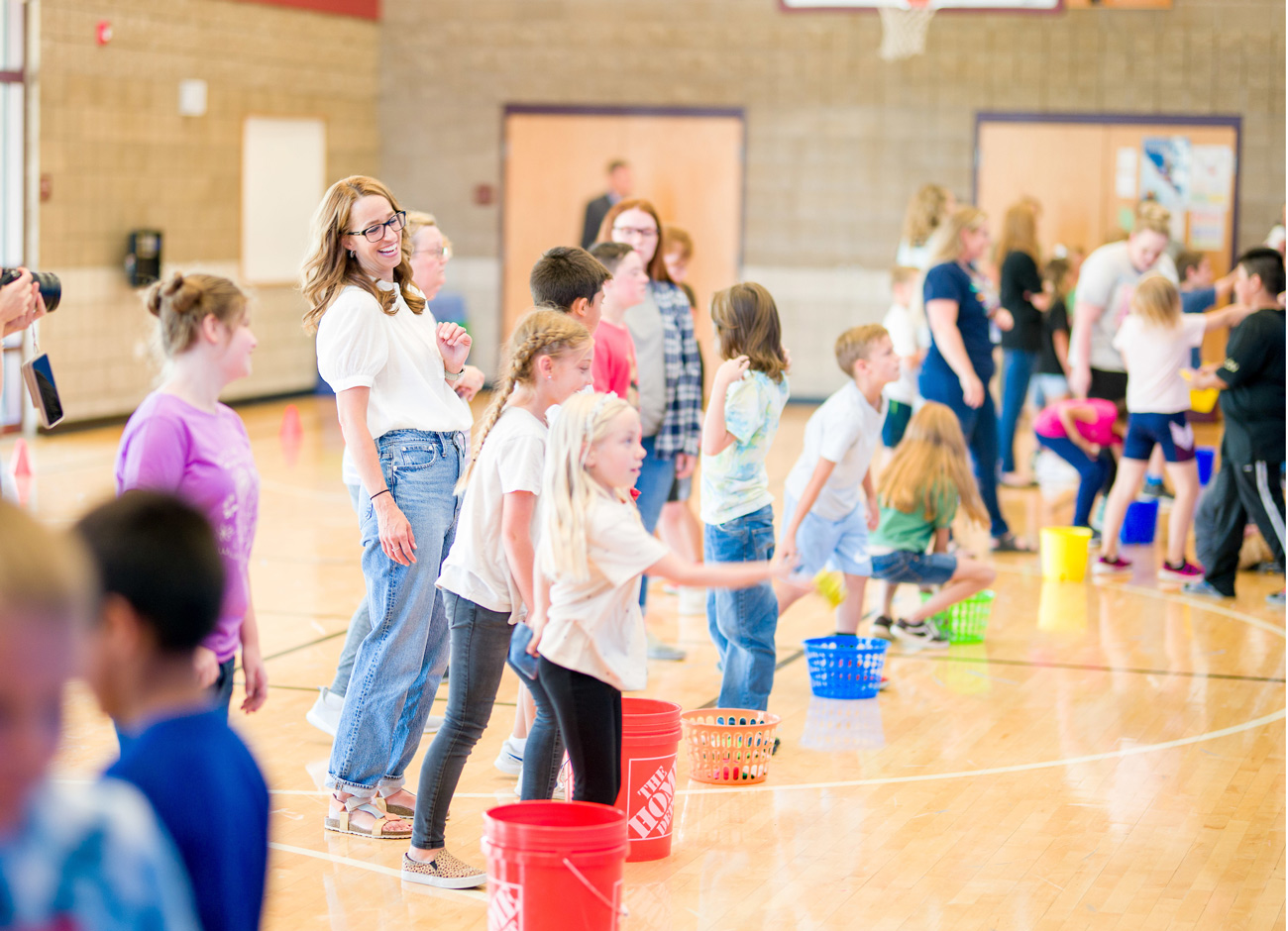
As the possibility that Spencer Cox ’98 was going to be elected Utah’s 18th governor began to look more and more probable during the fall of 2020, he and his wife, Abby ‘98, turned some of their attention towards what she might want her primary focus to be as the state’s next First Lady.
“When you decide to run for governor, you do let your mind wander once in a while and start thinking, Well, what if we actually won? What would that look like?” Governor Cox recalls. “And I remember asking Abby what she thought about her role, and what an initiative might be.”
Since it’s become customary that the partner of a president or a governor raise awareness of a specific issue or create a campaign to combat a societal ill, it was natural that Abby, who grew up on a 600-acre farm in Mount Pleasant, Utah, was going to take on something quite significant as First Lady. And not long after he became governor on Jan. 4, 2021, Spencer Cox found out what Abby’s point of emphasis was going to be.
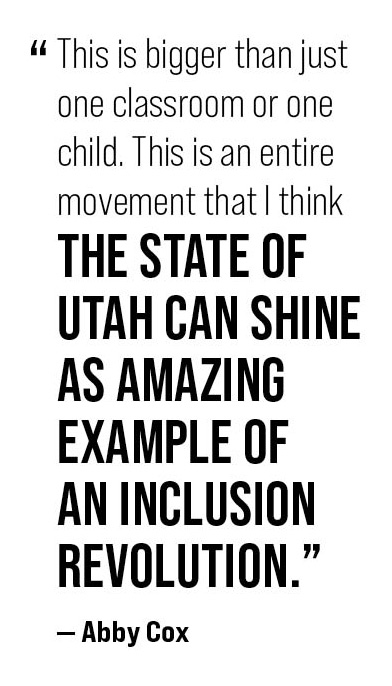
Make that points of emphasis.
“I’ll be honest,” Governor Cox continues. “With every other first spouse in the country, you end up with an initiative. One thing. So, I didn’t expect to see four pillars for her initiative. That’s very ambitious. And yet, it didn’t surprise me, I guess. Just because I know her, and when she does anything, it’s big and it’s hard.
“But she was raised to do hard things, and that’s been her mantra our entire life together,” Governor Cox adds.
What Abby Cox rolled out in April 2021 was the Show Up initiative, a “rallying cry” with four areas of focus: service, foster care, educator wellness, and Special Olympics Unified Sports.
“Show Up is about connection. Show Up is about empathy,” she explains. “But it’s also about giving a voice to those that haven’t traditionally had a voice. It’s about growing compassion and growing empathy and connecting as communities.”
Abby Cox explains that during the COVID-19 pandemic and “a really tough campaign,” she and her husband “felt there was a real need for people to come together, and for people to see one another as humans. … I think COVID was unique in that it was a natural disaster that instead of bringing us together — which usually happens — it really did divide us because of the nature of it, and we had to be apart. And I think as humans, we crave connection. We crave a sense of belonging and inclusion.”
Since unveiling Show Up, Abby Cox has crisscrossed the state with her small team, organizing and/or attending events — both big and small — that highlight the different aspects of the initiative. One week it might be a fundraiser to assist Ukrainian refugees; the next hosting a symposium for teachers.
In September, Abby Cox spent a day in Cache Valley, visiting a local high school in the morning with her husband, before going off on her own to interact with employees at Utah State University’s Val R. Christensen Service Center and paying a visit to the Student Nutrition Access Center (SNAC) food pantry in the Taggart Student Center, then meeting with faculty and staff at the Emma Eccles Jones College of Education.
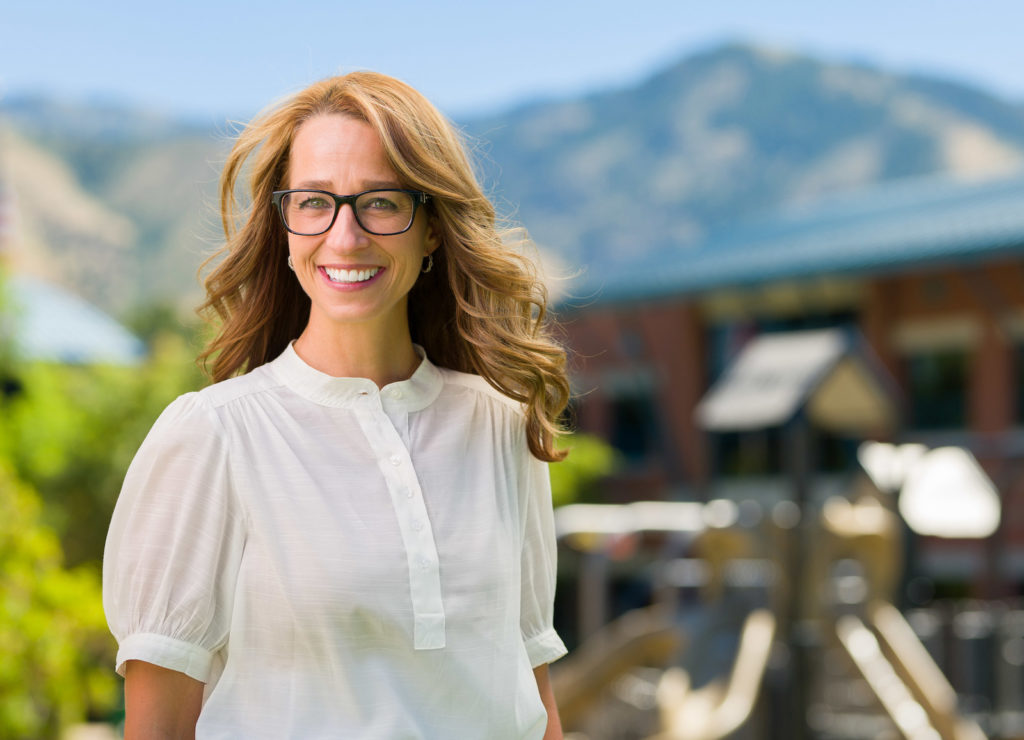
She later spent time at Heritage Elementary School in Nibley where she met with special education students, teachers, and administrators before playing with the students as they participated in Unified Sports activities — a growing effort pioneered by Special Olympics that joins people with and without intellectual disabilities on the same team.
“Everybody is different and has something that makes them special,” Jeni Buist, director of special education for the Cache County School District notes. “Our normal is that everyone is different, and we all need to be able to accept that and enjoy those types of things. These programs make all of our students more well-rounded and accepting.”
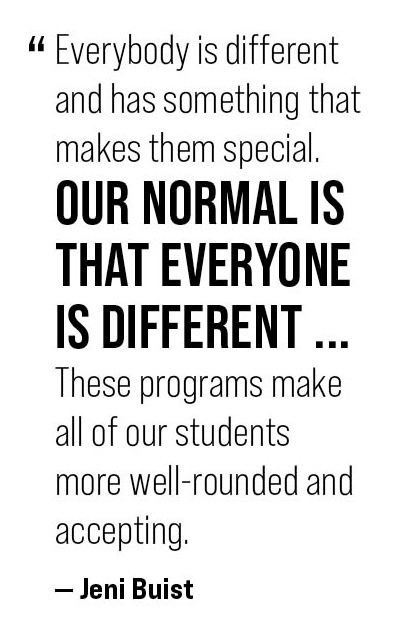
For Abby Cox, who graduated from USU with a bachelor’s in special education with a dual emphasis in early childhood and severe disabilities, it was clear from the huge smile on her face while in Nibley that she was an environment where she feels comfortable and happy.
“My team always jokes that they get worried every time that I go into a school that they’re not going to get me out,” Cox says with a laugh. “I love being at schools. I love being with students. And there’s just nothing more joyful than when I get to spend time with our children of determination. They’re beautiful souls and they teach me so much.”
Facing Life’s Challenges
A funeral is always a time of contemplation — especially when it’s a parent. It’s only natural to reminisce about the life of that person and how they helped shape you as an individual.
Utah State Magazine’s interview with Abby Cox came in October just over a week after the funeral for her father, Kenneth Palmer, in her hometown. Palmer passed away at the age of 76 after raising 10 children — eight of them girls — alongside Abby’s mother, Charlene. The loss of her father was still very much on her mind.
The last 35 years of Ken Palmer’s life he was diagnosed with transverse myelitis, a disorder similar to multiple sclerosis, rheumatoid arthritis, numerous surgeries, and had half of his jaw removed due to cancer.
“‘Health challenges’ seems like a mild phrase for what he suffered from all of those years,” Abby says of her father. “But he taught me so much as he battled chronic pain for 35 years. … I never heard him complain, and he never lost his optimism. He never lost his joy for living or lost a moment to teach and to show compassion and love for his family.”
“It seems unbelievable, but I watched him go through all that without it destroying his hope,” Abby continues as she wipes away some tears. “And he taught me to keep getting back up when you get knocked down. Each surgery he had, we thought, This is the end. There’s no way he comes back from this surgery. But he continued to come back and persevere and push through pain and still connect with his family.”
Abby, who played basketball and volleyball at North Sanpete High School, learned that as the child of a rancher, “even when things are tough, you still have to go out and move sprinkler pipe or feed the sheep, even at 10 o’clock at night after a game.”
It was at North Sanpete that she first became friends with Spencer Cox, who grew up in nearby Fairview. They dated a little bit in high school and while Spencer attended Snow College before leaving on a two-year mission for the Church of Jesus Christ of Latter-day Saints. Cox was happy to find Abby was still single when he returned home from Mexico, and after reconnecting and outlasting another romantic rival, Spencer asked Abby to marry him with the idea that they would continue school at Brigham Young University.
What Spencer didn’t know was how deep Abby’s ties were to Utah State. While Ken Palmer played football at Weber State, Charlene graduated from Utah State, as did one of Abby’s grandfathers. And eventually, all nine of her siblings and “most of their spouses” would complete degrees at USU, so her educational plan was firm.
“I said, ‘That’s great. I’ll marry you. But I’m going to Utah State. I’m ready to go. I’m enrolled in the special education program,’” Abby recalls. “…And so, he said, ‘I guess I’m going to Utah State.’ And he went to Utah State he loved it.”
Spencer Cox confirms that’s the way things went down, and how the future governor — who was raised by BYU fans — ended up graduating from Utah State with a degree in political science.
“I remember going home and telling my dad, ‘I think I’m an Aggie now.’”
A Very Special Education
For a couple that now resides in the Governor’s Mansion in downtown Salt Lake City, the description of Abby and Spencer Cox’s newlywed apartment in Logan is rather humbling. Located along 100 West, the studio apartment was a former carport that had been divided in half and made into two tiny domiciles. Cigarette smoke routinely filtered into their living space from the adjoining apartment, while the couple renting the adjacent house regularly engaged in loud domestic squabbles.
“It was really rough conditions,” Governor Cox notes. “The refrigerator was the headboard for our bed.”
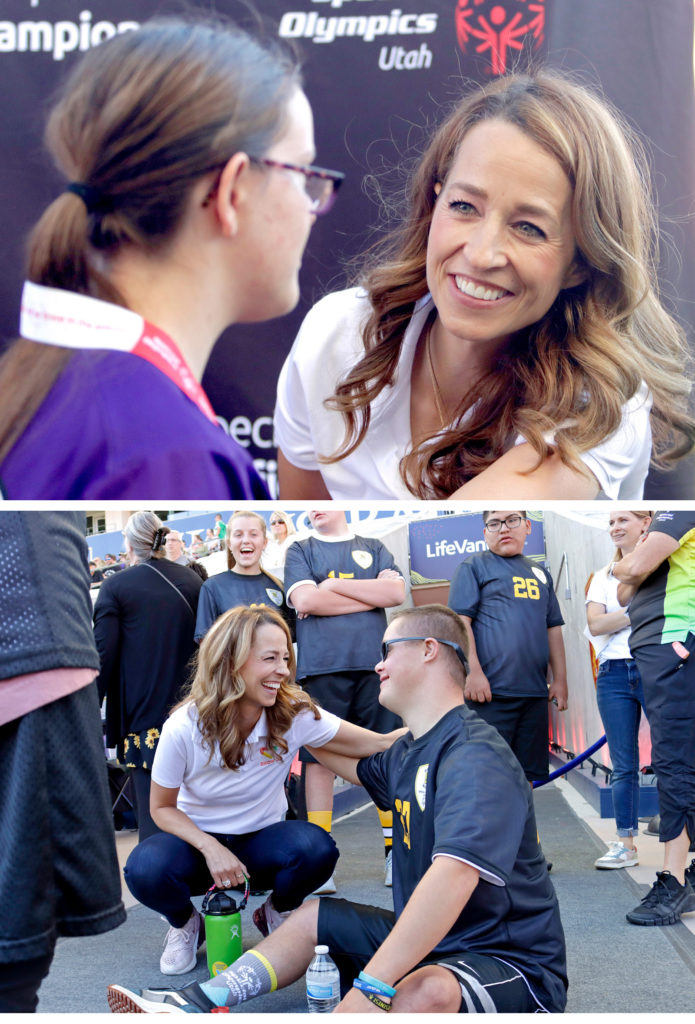
During that time, the Coxes owned one vehicle, which Abby took to work to her job at the USU Purchasing office. That left Spencer with a bicycle that he pedaled up the hill to Old Main in the mornings, then later to his job at Randy Ivie’s Allstate insurance office.
“We didn’t have any money; we were just scrapping to get by,” Governor Cox says. “We didn’t want to take out any loans, so we were both working. Fortunately, I was able to get a scholarship after I started there, which was just enough for us to get through. But we just had so much fun. We met new people, and we loved our professors.”
One professor who was particularly influential for Abby was Barbara Fiechtl, a clinical instructor in the Department of Special Education. Fiechtl helped oversee Abby’s student teaching at nearby River Heights Elementary School, as well as back in Virginia, where the Coxes relocated after Spencer graduated so he could attend law school at Washington and Lee University.
“She was really pivotal in helping me to see my potential as an educator,” Abby says. “That was back before the internet was a big thing, and certainly video over the internet was not really a thing at all. So, I actually videotaped my programs there in Virginia, and I would mail back them to Barb and she would do her evaluations.
“She bent over backwards to help me, and to see my potential. So, I am so grateful for her and her help, and really making sure that I was able to graduate.”
Fiechtl, who has been at USU since 1984 and is currently the program coordinator for special education and rehabilitation counseling, remembers Abby Cox as “a very good and conscientious student, always asking questions to explore ideas at a deeper level.”
“We discussed feedback on the phone and in written format throughout the semester,” Fiechtl adds. “Even at a great distance from her university supervisor for support, she was highly successful at completing all requirements. She showed great initiative and high motivation even back then.”
Abby Cox was pregnant with the first of the couple’s four children while completing her degree, and decided to focus on raising their kids: Gavin, 23; Kaleb, 21; Adam, 18; and Emma Kate, 15 rather than pursue full-time work as a special education teacher. With the boys now off to school at Southern Utah University and Emma Kate in high school, Spencer Cox’s governorship has her out in front as an ambassador for the state and the driving force behind the Show Up initiative.
“What you see is what you get with her,” Governor Cox says of his wife. “There’s nothing fake about her. She loves people, and she was really built for this job.
“She was a stay-at-home mom for 20-plus years, and this is kind of her time to be unleashed on the state in such a positive way,” he adds. “She is making such a difference, and I am truly blessed to have the love my life — my high school sweetheart — serving alongside me and making the world a better place.”
A Change in the World
Born in the Bicentennial year of 1976, Abby Cox was named after Abigail Adams, the wife of John Adams and the second First Lady of the United States.
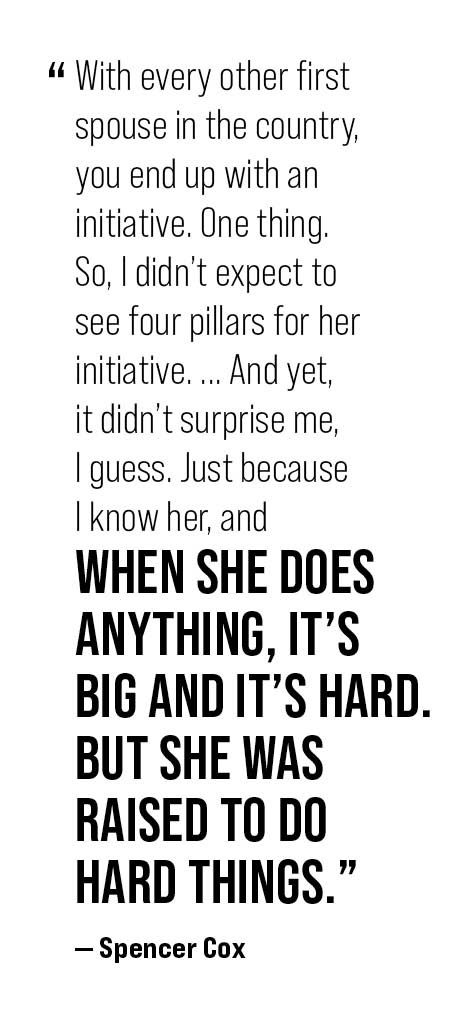
Perhaps that’s why she seems to have slipped so easily into the role of Utah’s First Lady, a position that has taken the “farm girl from Mount Pleasant” to meet the President of the United States, to Israel and the United Arab Emirates to meet with their leaders, and backstage at Vivint Arena to rub shoulders with Brandon Flowers, the lead vocalist of The Killers.
“There are moments when you have to pinch yourself and say, ‘I can’t believe I’m here,’” Abby admits.
In October, at America First Field in Sandy, the home of the Real Salt Lake Major League Soccer team, Cox hosted the state Unified Sports Soccer Championship, which included high school teams from all around the state. She helped kick off the day-long event in the morning, met with local political and business leaders in search of support at lunch, then helped hand out awards and congratulations alongside RSL goalkeeper Zac MacMath, Miss America Emma Broyles, and Miss Utah Lindsey Larsen in the afternoon.
Growing up, Abby had three close friends with Down Syndrome and says they were “some of the most influential people in my life,” including one that she reconnected with at her father’s funeral. She views unified sports as “something bigger … much bigger” than just an athletic activity.
“I truly believe that this generation can change the world; we can change our attitudes towards each other,” she declares. “What I have seen in the last few years in the public square is a vitriol and a hatred and an outrage and a division that is dangerous and scary. And it’s scary for our kids to see adults hurting each other in the way that we are. And it really hurts my heart to watch our kids watching that and seeing that as an example. And I see unified sports changing that completely.”
Abby Cox explains that having kids of different stories and abilities and backgrounds connect through sports can foster “a movement of inclusion; this movement of love and compassion and belonging.” And she says that she has been told repeatedly that schools that are involved with Unified Sports have a change in “the entire school environment.”
“It’s my goal to get it in every school,” she continues. “This is bigger than just one classroom or one child. This is an entire movement that I think the state of Utah can shine as amazing example of an inclusion revolution.
“I truly believe — and I know it sounds like pie in the sky — but I truly believe that this is a program that can really change the world.”
By Jeff Hunter ’96
Video by Taylor Emerson



